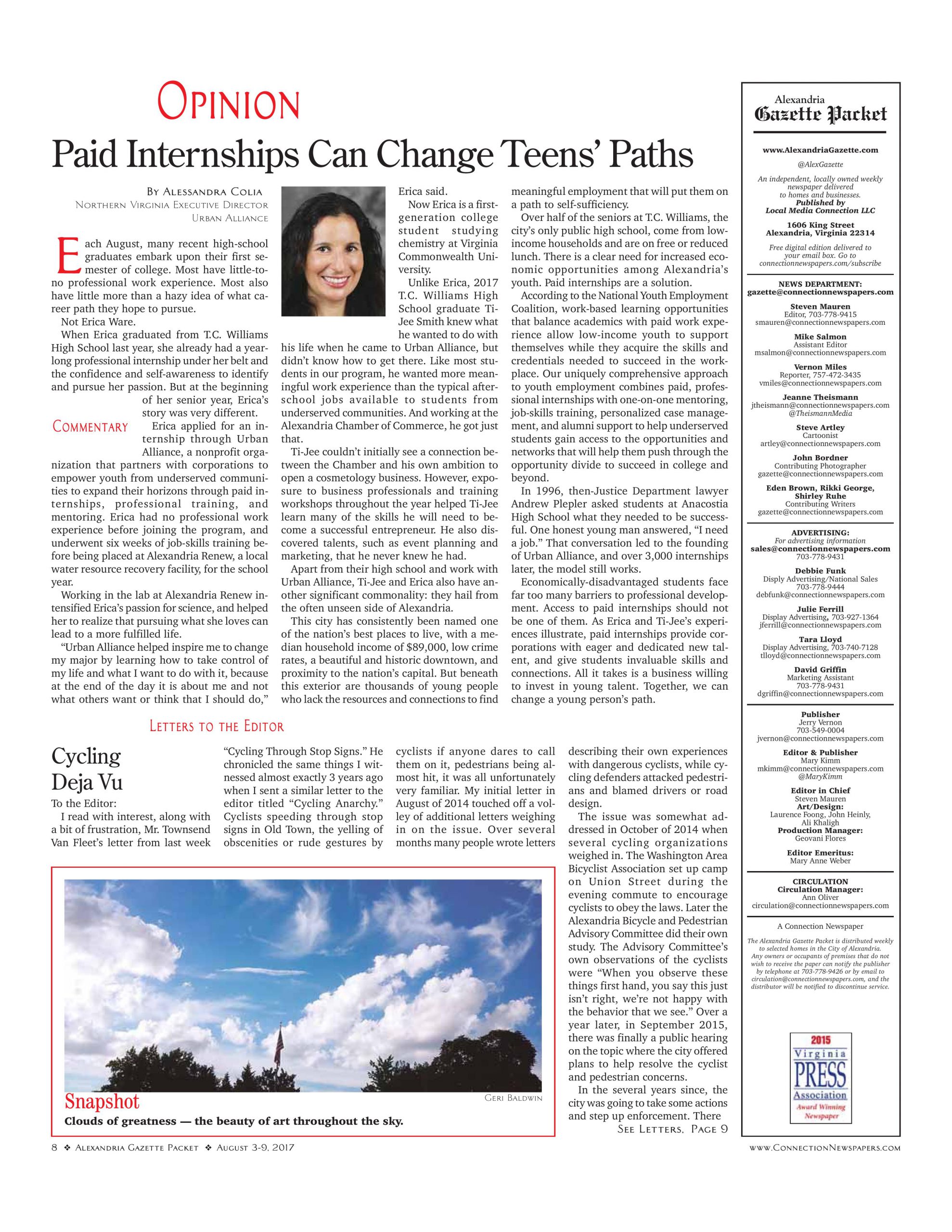Our Northern Virginia Executive Director Alessandra Colia penned an op-ed in this week’s edition of the Alexandria Gazette Packet.
Here’s what she wrote:
Paid internships can change a teenager’s path
Each August, many recent high-school graduates embark upon their first semester of college. Most have little-to-no professional work experience. Most also have little more than a hazy idea of what career path they hope to pursue.
Not Erica Ware.
When Erica graduated from T.C. Williams High School last year, she already had a year-long professional internship under her belt and the confidence and self-awareness to identify and pursue her passion. But at the beginning of her senior year, Erica’s story was very different.
Erica applied for an internship through Urban Alliance, a non-profit organization that partners with corporations to empower youth from underserved communities to expand their horizons through paid internships, professional training, and mentoring. Erica had no professional work experience before joining the program, and underwent six weeks of job-skills training before being placed at Alexandria Renew, a local water resource recovery facility, for the school year.
Working in the lab at Alexandria Renew intensified Erica’s passion for science, and helped her to realize that pursuing what she loves can lead to a more fulfilled life.
“Urban Alliance helped inspire me to change my major by learning how to take control of my life and what I want to do with it, because at the end of the day it is about me and not what others want or think that I should do,” Erica said.
Now Erica is a first-generation college student studying chemistry at Virginia Commonwealth University.
Unlike Erica, 2017 T.C. Williams High School graduate Ti-Jee Smith knew what he wanted to do with his life when he came to Urban Alliance, but didn’t know how to get there. Like most students in our program, he wanted more meaningful work experience than the typical after-school jobs available to students from underserved communities. And working at the Alexandria Chamber of Commerce, he got just that.
Ti-Jee couldn’t initially see a connection between the Chamber and his own ambition to open a cosmetology business. However, exposure to business professionals and training workshops throughout the year helped Ti-Jee learn many of the skills he will need to become a successful entrepreneur. He also discovered talents, such as event planning and marketing, that he never knew he had.
Apart from their high school and work with Urban Alliance, Ti-Jee and Erica also have another significant commonality: they hail from the often unseen side of Alexandria.
This city has consistently been named one of the nation’s best places to live, with a median household income of $89,000, low crime rates, a beautiful and historic downtown, and proximity to the nation’s capital. But beneath this exterior are thousands of young people who lack the resources and connections to find meaningful employment that will put them on a path to self-sufficiency.
Over half of the seniors at T.C. Williams, the city’s only public high school, come from low-income households and are on free or reduced lunch. There is a clear need for increased economic opportunities among Alexandria’s youth. Paid internships are a solution.
According to the National Youth Employment Coalition, work-based learning opportunities that balance academics with paid work experience allow low-income youth to support themselves while they acquire the skills and credentials needed to succeed in the workplace. Our uniquely comprehensive approach to youth employment combines paid, professional internships with one-on-one mentoring, job-skills training, personalized case management, and alumni support to help underserved students gain access to the opportunities and networks that will help them push through the opportunity divide to succeed in college and beyond.
In 1996, then-Justice Department lawyer Andrew Plepler asked students at Anacostia High School what they needed to be successful. One honest young man answered, “I need a job.” That conversation led to the founding of Urban Alliance, and over 3,000 internships later, the model still works.
Economically-disadvantaged students face far too many barriers to professional development. Access to paid internships should not be one of them. As Erica and Ti-Jee’s experiences illustrate, paid internships provide corporations with eager and dedicated new talent, and give students invaluable skills and connections. All it takes is a business willing to invest in young talent. Together, we can change a young person’s path.
